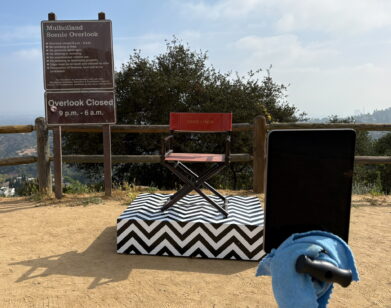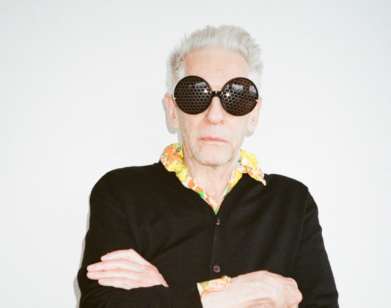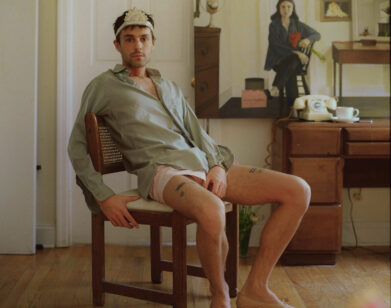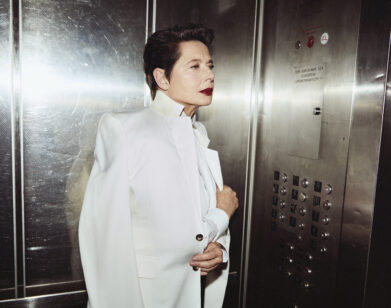Heather Graham sends up Hollywood’s toxic masculinity in her directorial debut
 Heather Graham has been a mainstay in both indies and comedies since License to Drive and Drugstore Cowboy in the late ‘80s. Her performances, especially her lauded turn as Rollergirl in Boogie Nights [1997], were often sex-positive and presented with an agency and enthusiasm rare from others cast in similar roles.
Heather Graham has been a mainstay in both indies and comedies since License to Drive and Drugstore Cowboy in the late ‘80s. Her performances, especially her lauded turn as Rollergirl in Boogie Nights [1997], were often sex-positive and presented with an agency and enthusiasm rare from others cast in similar roles.
Her intense fascination with sexuality is as deeply felt in her performances as the roles themselves—as sex workers or other objects of the male gaze—position her for a thoughtlessness stereotypical in the film industry. Reclaiming these roles and using her position as a decades-long sex symbol, Graham has written and directed her first movie, Half Magic.
Half Magic, a romantic comedy about sexism in the film industry (and the world at large), focuses on women sick of being mistreated by men, leaving Graham’s character Honey to negotiate her position in Hollywood and her relationships to men and sex. Honey, along with friends played by Stephanie Beatriz and Angela Kinsey, tackle their love lives, their friendships, and sexually harassing bosses with a bit of witchery a la The Craft [1996]—only their magic is mostly hope and good intentions.
This is all perfectly positioned in the wake of the #MeToo movement disrupting the predatory status quo of the entertainment world. When I sat down with Graham to discuss her directorial debut, she was eager to talk about the shifting ideals of the film world.
JACOB OLLER: I know you’ve been shopping this script around since 2014, so this has been on your mind a while—how was the experience getting this to the public?
HEATHER GRAHAM: It was hard getting the financing. We have a friend named Michael Nickles, who’s a producer on the movie, and I was writing the script during a breakup. I wanted to find a way to laugh at all the things in life that had really upset me, and Michael said “You should direct this.” He helped me find these financiers and we went into pre-production, then they told us they didn’t have the rest of the money. We had to shut down the film and it was devastating. So stressful. Then I met Bill Sheinberg who told me “if you get the rights back and all your legal stuff is kosher, I’ll make the movie.” We had to get this quitclaim [deed], we got the rights back, and finally we made the movie. It was a long road and, luckily, it’s coming out at a time when people are open to the subject matter in a way they’ve never been before.
OLLER: It really feels like Chris D’Elia’s film executive character in the film grew out of these Harvey Weinstein allegations, but you had this written years ago.
GRAHAM: Of course guys have been acting this way for a long time. Finally America decided “this isn’t cool anymore.” Hopefully that makes people more open to my story, which is about sexism, sexual harassment, and all that specifically in the entertainment business.
OLLER: As someone switching to a new side of the business, I know you’ve said that as an actor playing a part, it’s your job to be on your character’s side, so you have to see it all from that perspective—how does that job change when you’re also the director?
GRAHAM: An actor could be playing a person who’s crazy or a person who’s mean, a person whose point of view you don’t agree with but have to find their point of view. When you make a movie you can tell a story from your own perspective and tell the story you want to tell. I wanted to inspire and empower women, and men too, by opening up a conversation about sexism, relationships, and sexuality. I think women in our culture are presented with a mixed message. On one hand we’re told “your looks are the most important thing and you have to look sexy” while we’re also told “don’t be too sexy or we’re gonna judge you harshly.”
OLLER: One of my favorite lines from the film is during a script discussion where your character says “I like sluts, why do they all have to die?” which is a funny way of summarizing these sex-positive values.
GRAHAM: I did want to be sex-positive because our culture is sexist. If you see a male hero and he’s James Bond and having sex with all these people, everyone thinks he’s so cool. If you watch, for example, a horror film, and you see a girl that has sex with a guy, you know she’s gonna die. In film and in life, women are punished for things that men are celebrated for.
OLLER: In terms of your direction, did you try to subvert this?
GRAHAM: I mean I made the women the protagonists. Most movies have men protagonists with women as the objects. Mine has female protagonists and men that are…maybe “objects” is the wrong word..
OLLER: I think there’s definitely some fun objectification done with something like Luke Arnold’s dancing, especially since the way you film sex scenes and physical comedy feels very linked.
GRAHAM: I’m glad you said that because his whole character actually happened to me. I met this guy who, I didn’t realize it at the time, but he was doing a lot of drugs. He was all “I make up my own exercises” and stuff, but he was so cute! So later I thought “that’s kind of crazy” but he was so handsome I let it slide. I was definitely making fun of not seeing red flags. A guy that breaks up with you by telling you he wants to go climb a mountain but he really wants to go do drugs? At the time it was devastating, but in retrospect it’s so obvious.
OLLER: Wait, the mountain stuff is real?
GRAHAM: Everything in that breakup scene is real. Everything the guy says to her is real. “I have wars to fight, I have mountains to climb…” Someone actually said that to me.
OLLER: Were any other lines from the script taken from your life?
GRAHAM: A lot. When she’s at work and her boss tells her “If you want to get a movie made, write about a man. Nobody cares about women stories.” I was developing stories for years that I wanted to act in and produce, and a lot of people would tell me that exact thing.
OLLER: Wow.
GRAHAM: For anyone outside the industry it sounds crazy, right? The hardest part of doing this movie was getting someone to give me the money. People are scared to take a chance [on a female filmmaker].
OLLER: Do you think that will change in the wake of the #MeToo movement?
GRAHAM: Hopefully. I think people want to be on the right side of this issue, so they’re doing some affirmative action. But if you look at the percentages of women directing film, it’s still around 7 percent.
OLLER: Does establishing a directorial foothold with Half Magic mean you’ll be pursuing more in the future?
GRAHAM: I’m working on two stories right now, one called Chosen Family about a woman’s dysfunctional family and how it repeats itself in her romantic relationships, and another one about cancer. They say they want to cure cancer but it’s such a big business that…do they really want to cure it? That’s the idea, anyways [laughs].
OLLER: Changing directions after that, when you direct the sex scenes you also star in, you use this really interesting superimposed shot of you and a sort of mystical outer space. Where did that idea come from?
GRAHAM: I put that in because I experienced something that felt like that. I grew up religious and was told I would go to Hell for having premarital sex. So I was having sex at one point and had this spiritual moment where I felt like the universe was telling me that sex is a beautiful, divine thing. Feel good about it! For the movie I went, “how do I express this?” So I figured, I’ll just do what I saw. This starry sky and this voice that talked to me. I actually got my yoga teacher to do the voice in the film. It’s a trippy part in a comedy movie, but it’s my personal experience around sexuality.
OLLER: Did any of that come from your interest in transcendental meditation? I heard you got into that after working with David Lynch.
GRAHAM: So I was in the original Twin Peaks when I met David and David’s really into it. He’d meditate every day at lunch. I was like 20, which is a hard age when you’ve left your parents and want to become your own person. I definitely had a bit of angst and talked to him about that. He said I should really try meditating and I figured, what do I have to lose? I’ve been doing it ever since then. It helped me break a lot of bad habits, like I used to eat a ton of junk food.
HALF MAGIC WILL BE RELEASED IN THEATERS AND ON VOD FEBRUARY 23.






